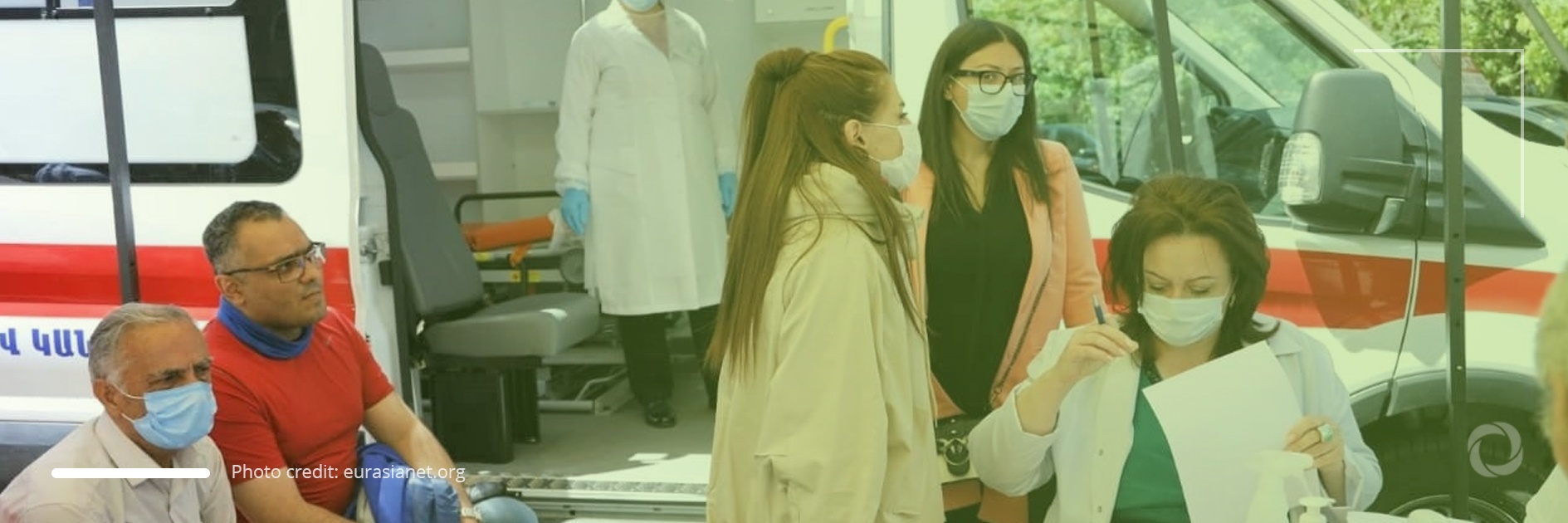Armenia, a country with a population of three million, in South Caucasus, launched its vaccination campaign in April this year when the daily average number of confirmed COVID-19 cases was around 1,000. As of 4 July, the average daily infection rate had fallen to about 100 cases. Nevertheless, the vaccination campaign is somewhat slow with many people being reluctant either because of a shortage of reliable information or because of misinformation.
DevelopmentAid interviewed Violeta Zopunyan, the President of the Center for Rights Development, an NGO that specializes in the advocacy of human rights in the healthcare sector, to find out what challenges Armenia has been facing during this process.
Since the country has already experienced three waves of the pandemic, the authorities warned that vaccination was the only way to avoid a fourth. Armenia removed the age restriction on July 1, 2021, thus enabling everyone to be vaccinated on a voluntary basis and free of charge. The country has three vaccines available – AstraZeneca, Sputnik-V, and CoronaVac – and has so far announced no shortages. On the contrary, the media have reported that the residents of neighboring countries that are facing vaccine shortages, such as Iran, have been vaccinated in Armenia free of charge.
Discussing the nationwide vaccination campaign that was launched in an attempt to contain the spread of COVID-19, Violeta Zopunyan described the process as “challenging”. She highlighted that for Armenia, the most difficult period in the fight against the pandemic was the six-week territorial conflict with Azerbaijan that broke out in the autumn of 2020 when the number of COVID-19 cases soared more than four times, from about 300 cases on 27 September at the beginning of the conflict to over 1,400 cases on 14 November when it ended.
“In April 2021, the government authorities initiated the acquisition of AstraZeneca through the UN-led vaccine supply platform, COVAX. As the Ministry of Healthcare announced that the government’s objective is to have up to 700,000 Armenians vaccinated within a year, it continued negotiations to bring a new vaccine, as a result of which the Chinese CoronaVac also became available. Currently, people aged 18 and over can be vaccinated with AstraZeneca and CoronaVac. Sputnik-V is intended for chronic patients over 18 years old, health workers aged 18 to 54, and residents as well as employees of social care centers. People are jabbed based on pre-registration at primary health care organizations every day of the week. There are also mobile vaccination groups in public places, such as shopping malls, areas near subway stations, parks, squares, or cafes. Both Armenian and foreign citizens can be vaccinated voluntarily. Nevertheless, despite the efforts of the ministry, the process is generally quite slow, so far (as of June 21, 2021) 64,293 people have been vaccinated.”
Touching upon the Armenians’ obvious reluctance to be vaccinated, Violeta Zopunyan noted that the anti-vaccination mood had already spread across the country years before the pandemic broke out. Armenians were rather reluctant to accept vaccines as some imported in 2018 were associated with negative side effects which aroused a massive number of complaints, she explained.
“Hence, the public opinion of the COVID-19 vaccine was split: one side was against the use of any vaccine, as there was a strong suspicion about its quality, and about ways of earning money through it or conspiracy theories. The rest of society was very cautious about the infection. As soon as the first batch became available, this part of society was willing to be vaccinated as soon as possible.”
The attitude towards the type of vaccine differs as well, as our interviewee explained.
“According to doctors’ observations, Armenians are showing high interest in the Russian Sputnik V vaccine; however, this is only available to high-risk groups. Such differentiation most likely stemmed from the media-spread worldwide negative opinion about the safety and efficacy of AstraZeneca.”
Tackling misinformation related to the pandemic is highly important, albeit costly, Violeta Zopunyan said. While reliable media outlets conducted information campaigns to raise public awareness regarding ways to contain the spread of the virus, others were seen to be sharing rumors and fake news about COVID-19.
“It is crucial to respect the rights while fighting the challenges related to the distribution of fake news. Money from the State’s health budget is being spent on disseminating information on vaccination, in particular through the use of social media, videos, telephone messages, and other methods. There have also been several talk shows on TV and other platforms on the COVID-19 vaccine. At the same time, there is a huge problem of fake information and disinformation in national as well as international media. Some people are looking for more scientific data on the vaccines available in Armenia that has been proved by national authorities because they can’t clearly identify the truth in the mass media. Due to misinformation and the lack of clarifying people’s requests, some are refusing to accept vaccination which may cause a potential risk of spreading the infection.”
In addition to the right to information, the rights to security and accessibility are equally important in the vaccination process, Violeta Zopunyan stressed.
“The Government is trying to ensure these but some questions and problems arise. From a safety point of view, the public has questions about the quality control of each imported batch, whether their samples are checked by our relevant authorities or if only the manufacturer’s documents are taken as a basis. Another safety risk is the process of vaccination in public places with high temperatures in hot summer weather which is carried out in ambulances. There are some doubts in terms of the safe storage, transportation, proper maintenance of the vaccine in open-air areas. It’s worth mentioning that there is no monitoring mechanism of the whole vaccination process by any independent body.”
As of 18 July, Armenia has reported a cumulative number of 227,430 coronavirus cases and 4,566 deaths. As many as 108,107 people have been vaccinated but only 30,658 have received both doses.

